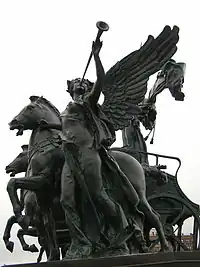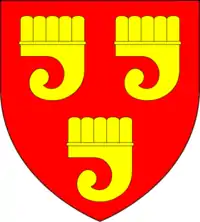clarion
English
Pronunciation


- (Received Pronunciation) IPA(key): /ˈklæ.ɹɪ.ən/
- (General American) IPA(key): /ˈklæ.ɹi.ən/, /ˈklɛ-/
Audio (GA) (file) - Rhymes: -æɹiən
- Hyphenation: clar‧i‧on
Etymology 1
The noun is derived from Middle English clarion, clarioun (“trumpet with a narrow tube and a shrill sound, clarion; clarion player”) [and other forms],[1] from Old French claron, clarïon (“clarion”) [and other forms], from Medieval Latin clāriōn, clario, clārōn (“clarion; trumpet”), from Latin clārus (“audible; clear, distinct, loud; (visually) bright, clear”),[2] ultimately from Proto-Indo-European *kelh₁- (“to call, summon; to cry”).
Noun
clarion (plural clarions)
- (music, historical or poetic) A medieval brass instrument chiefly used as a battle signal; related to the trumpet, it had a narrow, straight pipe and a high-pitched, piercing sound.
- The clarion’s call to action has been heard.
- 1667, John Milton, “Book I”, in Paradise Lost. […], London: […] [Samuel Simmons], […], →OCLC; republished as Paradise Lost in Ten Books: […], London: Basil Montagu Pickering […], 1873, →OCLC, lines 531–533:
- Then ſtrait commands that at the warlike ſound / Of Trumpets loud and Clarions be upreard / His mighty Standard; […]
- 1841 September 28, Henry Wadsworth Longfellow, “[Miscellaneous.] Excelsior.”, in Ballads and Other Poems, 2nd edition, Cambridge, Mass.: […] John Owen, published 1842, →OCLC, stanza 2, page 129:
- And like a silver clarion rung / The accents of that unknown tongue, / Excelsior!
- 1867, Ralph Waldo Emerson, “May-Day”, in May-Day and Other Pieces, Boston, Mass.: Ticknor and Fields, →OCLC, pages 33–34:
- There is no bard in all the choir, / Nor Homer's self, the poet sire, / […] / Nor Collins' verse of tender pain, / Nor Byron's clarion of disdain, / […] / Not one of all can put in verse, / Or to this presence could rehearse, / The sights and voices ravishing / The boy knew on the hills in spring, […]
- 1886 October – 1887 January, H[enry] Rider Haggard, “Triumph”, in She: A History of Adventure, London: Longmans, Green, and Co., published 1887, →OCLC, page 234:
- Blind me, take away mine eyes, and let the darkness utterly fence me in, and still mine ears would catch the tone of thy unforgotten voice, striking more loud against the portals of my sense than can the call of brazen-throated clarions:– […]
- (by extension)
- (poetic) The sound of a clarion (sense 1), or any sound resembling the loud, high-pitched note of a clarion.
- 1667, John Milton, “Book VII”, in Paradise Lost. […], London: […] [Samuel Simmons], […], →OCLC; republished as Paradise Lost in Ten Books: […], London: Basil Montagu Pickering […], 1873, →OCLC, lines 442–446:
- Others [i.e., other birds] on ground / Walk'd firm; the creſted Cock whoſe clarion ſounds / The ſilent hours, and th' other whoſe gay Traine / Adorns him, colour'd with the Florid hue / Of Rainbows and Starrie Eyes.
- 1728, [Alexander Pope], “Book the Second”, in The Dunciad. An Heroic Poem. […], Dublin, London: […] A. Dodd, →OCLC, page 26, lines 213–214:
- And his this Drum, vvhoſe hoarſe heroic baſe / Drovvns the loud Clarion of the braying Aſs.
- 1750 June 12 (date written; published 1751), T[homas] Gray, “Elegy Written in a Country Churchyard”, in Designs by Mr. R[ichard] Bentley, for Six Poems by Mr. T. Gray, London: […] R[obert] Dodsley, […], published 1753, →OCLC, page 29:
- The cock's ſhrill clarion, or the ecchoing horn, / No more ſhall rouſe them from their lovvly bed.
- 1811, Walter Scott, The Vision of Don Roderick; a Poem, Edinburgh: […] James Ballantyne and Co. for John Ballantyne and Co. […]; London: Longman, Hurst, Rees, Orme, and Brown, →OCLC, stanza LXII, page 54:
- [K]indling Nations buckle on their mail, / And Fame, with clarion-blast and wings unfurl'd, / To freedom and revenge awakens an injured World!
- 1858 October 16, Henry Wadsworth Longfellow, “[Birds of Passage.] Daybreak.”, in The Courtship of Miles Standish, and Other Poems, Boston, Mass.: Ticknor and Fields, →OCLC, page 195:
- O chanticleer, / Your clarion blow; the day is near.
- (music) An organ stop consisting of pipes with reeds giving a high-pitched note like that of a clarion (sense 1).
- (poetic) The sound of a clarion (sense 1), or any sound resembling the loud, high-pitched note of a clarion.
- (heraldry) A charge thought to represent a type of wind instrument, a keyboard instrument like a spinet, or perhaps a rest used by a knight to support a lance during jousting.
- Synonyms: clarichord, rest, sufflue
Derived terms
- clarion call
- clarionet
- clarionetist, clarionettist
Translations
|
|
Adjective
clarion (not comparable)
- Of a sound, a voice, a message, etc.: brilliantly clear.
- her clarion top notes
- 1841 September 28, Henry Wadsworth Longfellow, “[Miscellaneous.] Excelsior.”, in Ballads and Other Poems, 2nd edition, Cambridge, Mass.: […] John Owen, published 1842, →OCLC, stanza 4, page 130:
- And loud that clarion voice replied / Excelsior!
Etymology 2
From Middle English clariounen (“of a horn or trumpet: to blow, sound”),[4] from clarioun (noun) (see etymology 1) + -en (suffix forming the infinitives of verbs).[5] Later uses may also be derived directly from the noun.[6]
Verb
clarion (third-person singular simple present clarions, present participle clarioning, simple past and past participle clarioned) (rare)
- (transitive)
- To announce or herald (something) using a clarion (noun sense 1).
- (figuratively) To announce or herald (something) clearly, especially so as to stir or unite people.
- 1946, Rebecca Rogers, They Ask for Bread, New York, N.Y.: Rockport Press Publishers, →OCLC, page 16:
- His deep voice clarioned the words and he paused, hearing them whisper away into their last faint echoes in the organ loft.
- 1997, Cedric J[ames] Robinson, “The Search for Higher Ground”, in Black Movements in America (Revolutionary Thought/Radical Movements), New York, N.Y., London: Routledge, →ISBN, page 144:
- He [Martin Luther King Jr.] clarioned a call to action that was heard wherever Afro-Christians could be found (and beyond, if one recalls Pentecostalism).
- 2004, Brian Keenan, “First Footfalls in Fairbanks”, in Four Quarters of Light: A Journey through Alaska, London, Toronto, Ont.: Doubleday, →ISBN, page 28:
- All around me the tamaracks, alder birches and willows would send up amber and golden flares clarioning the winter; […]
- (figuratively) To announce or herald (something) clearly, especially so as to stir or unite people.
- (also figuratively) Of a thing: to cause (a place) to echo with a sound like that of a clarion.
- 1833, [Richard Henry Horne], “Of Composers, and Instrumental Performers”, in Exposition of the False Medium and Barriers Excluding Men of Genius from the Public, London: Effingham Wilson, […], →OCLC, page 49:
- Sir Knight, thy glory clarioneth the heavens.
- To announce or herald (something) using a clarion (noun sense 1).
- (intransitive) To sound a clarion; also, to make a high-pitched, piercing sound like that of a clarion.
- 1885, Richard F[rancis] Burton, transl. and editor, “Tale of the Bull and the Ass. [Night 1.]”, in A Plain and Literal Translation of the Arabian Nights’ Entertainments, now Entituled The Book of the Thousand Nights and a Night […], Shammar edition, volume I, [London]: […] Burton Club […], →OCLC, page 22:
- We dogs are all a-mourning; but thou [a rooster] clappest thy wings and clarionest thy loudest and treadest hen after hen.
- 1890, Antipater of Thessalonica, “Sect. I. Love. [At Cockcrowing]”, in J[ohn] W[illiam] Mackail, transl., Select Epigrams from the Greek Anthology […], London, New York, N.Y.: Longmans, Green, and Co., →OCLC, epigram XXIV, page 100:
- Grey dawn is over, Chrysilla, and ere now the morning cock clarioning leads on the envious Lady of Morn.
- 1921, Irvin S[hrewsbury] Cobb, A Plea for Old Cap Collier, New York, N.Y.: George H[enry] Doran Company, →OCLC, pages 48–49:
- [N]ow groaning, now with his eye flashing, now with a tear—undoubtedly a frozen tear—standing in the eye, now clarioning, now sighing, onward and upward he goes: […]
- 1986 September 15, Stephen King, “Eddie’s Bad Break”, in It, New York, N.Y.: Viking, published November 1986, →ISBN, part 4 (July of 1958), section 4, page 787:
- He heard his mother bugling and clarioning outside, and he tried to tell the nurse not to let her in, but no words would come out, no matter how hard he tried.
Derived terms
- clarioning (noun)
Translations
|
References
- “clariǒun, n.”, in MED Online, Ann Arbor, Mich.: University of Michigan, 2007.
- “clarion, n.”, in OED Online
 , Oxford, Oxfordshire: Oxford University Press, March 2022; “clarion, n.”, in Lexico, Dictionary.com; Oxford University Press, 2019–2022.
, Oxford, Oxfordshire: Oxford University Press, March 2022; “clarion, n.”, in Lexico, Dictionary.com; Oxford University Press, 2019–2022. - “clarion, adj.”, in Lexico, Dictionary.com; Oxford University Press, 2019–2022.
- “clariǒunen, v.”, in MED Online, Ann Arbor, Mich.: University of Michigan, 2007.
- “-en, suf.(3)”, in MED Online, Ann Arbor, Mich.: University of Michigan, 2007.
- Compare “clarion, v.”, in OED Online
 , Oxford, Oxfordshire: Oxford University Press, March 2022.
, Oxford, Oxfordshire: Oxford University Press, March 2022.
Further reading
 clarion (heraldry) on Wikipedia.Wikipedia
clarion (heraldry) on Wikipedia.Wikipedia  clarion (instrument) on Wikipedia.Wikipedia
clarion (instrument) on Wikipedia.Wikipedia  clarion (disambiguation) on Wikipedia.Wikipedia
clarion (disambiguation) on Wikipedia.Wikipedia